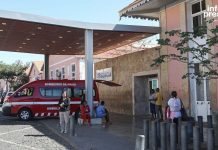Africa-Press – Cape verde. Throughout the various reports in this section, and despite the lack of response from some subjects, A NAÇÃO tried to raise the debate on the current situation of domestic flights, as well as international ones, in a bridge between the past and the present. After all, are we better, or worse, since the privatization of inter-island air links? Mário Paixão, former chairman of the Board of Directors of ASA (2001 to 2015), with a wide range of experience in the sector, has been a critical voice in this matter.
From his point of view, in terms of domestic flights, he has no doubt: “We are worse off”, despite all the constraints that also occurred at the time, before the Government proceeded with the privatization of the sector.
In the domestic case, Mário Paixão begins by recalling, “TACV left the market in 2017, after Binter Cabo Verde took over this service. There was no contract for the concession of domestic operations and the initial Bintaço promotions were followed by a series of conflicts between Binter/TICV and the AAC (aeronautical authority), with all kinds of blackmail and unbelievable price increases”.
In his view, at the time, the “government was interfering as it wished in the competences of the aeronautical authority”, and the pandemic crisis ended up “aggravating” the situation that “devolved” to an emergency concession contract with BestFly for six months, initially , and the company later bought TICV (formerly Binter).
“Passenger services have deteriorated enormously, Bestfly has dismantled agencies on the islands, successive breakdowns have penalized air connections, confidence in air transport has fallen, prices are still very high and travel between islands remains precarious”, he argues.
“Decent Links”
Mário Paixão is critical and questions, as “bizarre”, that a country that wants to be a tourist destination of “excellence is not capable of promoting worthy air connections to its own people, much less foreign visitors who want to visit other islands”.
Asked if the model we have, which turns out to be a monopoly owned by Bestfly and before Binter, is the one that best serves the interests of Cape Verdeans, he is surgical in saying no: “Cape Verdeans are concerned with frequent connections , point-to-point routes and good prices”.
In this context, he argues that it would be up to the government to prepare “a specification and submit it to interested parties and potential concessionaires, establishing conditions, rights and duties of each party, including public service obligations”.
regulatory authority
Our interlocutor argues that the concession of air services to private companies “is not done on one’s knees”, much less “without transparency and removing competences from the independent regulatory authority”.
In a liberalized market, he argues, these competencies “should be reinforced and not diminished”. “We all foot the bill for this misconduct by the government.”
Asked whether or not we can consider a bad management of Bestfly, given all the problems already mentioned, the same is considered and distributed, so to speak, possible responsibilities.
“Of good or bad management, shareholders and the aeronautical authority that holds legal instruments for supervision, auditing and issuance of certificates and licenses to the air operator should speak. In view of BestFly’s performance and technical and operational problems and the repeated failures in customer services, it can be inferred that there are management problems and that there is an omission on the part of the Civil Aviation Agency in inspections and supervision”.
Loss of supervisory ability
In the view of this analyst, the AAC “lost supervisory and regulatory capacity”, whether, as he says, “the fault” of the government or the administration.
“There was a stampede of the technical staff that were trained at the price of gold. Where are? Abroad, working with governments and institutions that value their quality and experience. It was they who built this robust institutional, regulatory and operational edifice that gave Cape Verde enormous prestige in the African sub-region and in the world”, he recalls.
In this respect, he is sharp in saying that the government “failed” to value this human capital. Now, he says he hopes that “those who are there” and “the Administration now reinforced” will have “the courage to reverse the eroded capacity”.
However, it shows that it is possible to reverse the situation for the sake of air connectivity between the islands. “But in aviation it is never too late to correct management failures and ensure safety and confidence in air services.”
Solution: mixed fleet adapted to Cape Verde
Asked what model he suggests so that we can have more efficient and cheaper inter-island air transport, Mário Paixão says that he has always defended a model in which the government defines a specification, based on a market study prepared by an independent specialized company. . After that, interested parties present their proposals for air services.
“The practice has not been good: manufacturers and lessors come here with their proposals, imposing their solutions in terms of fleet that end up penalizing routes, frequencies and prices”, he says.
The result, he says, is that, with different routes in terms of distance and traffic, we have, for example, the same air means or an “unsuitable” means serving São Vicente-Santiago in 35 minutes and Santiago-May in seven minutes. .
And he guarantees: “Everyone loses out: users who will be penalized in frequencies and in the price for the existence of excess capacity, the carrier that has to deal with catadupa maintenance due to the intensity of rotations – landings and take-offs – on routes of short range, services with low levels of quality and satisfaction and the government that has to manage chain instabilities”.
The solution, he argues, involves a mixed fleet, with at least two types of aircraft with adequate capacity for Cape Verde’s conditions. “The market offers efficient models with much lower operating costs, which would have a positive impact on consumer prices and traffic, including incentives for domestic tourism”.
Continuity of TACV, for “strategic” reasons
Despite being transformed into a pit of losses and a sink of taxpayers’ money for many years, Mário Paixão defends the continuity of TACV, whether in public, private or mixed form, for strategic reasons.
“We are islands, with a tiny and fragmented endogenous market, on the periphery of Europe and West Africa. We are isolated and extremely dependent on TAP, which takes advantage of its insertion in an alliance and a good network of routes in the world to capture traffic to the Lisbon Hub, imposing an unattractive tariff model for Cape Verdean passengers”, he explains.
TACV’s “evils”, he admits, are “long-standing” and can be “corrected”, as he says, with “professional” management that knows the industry, “protected from political interference”.
“If this is not possible, then TACV will remain in a coma and the tubes will be disconnected sooner than expected. In any case, we are well served by TAP and other airlines in terms of connectivity, regularity, trust and safety”, he concludes.
Hub – “pure fantasy”
Asked if the intention of creating a Hub is still worthwhile, Mário Paixão recalls that the concept of “Hub and Spoke” was a vision he helped to build in 2003.
“It had TACV as a pivot because those who make the Hub are good airlines, supported by traffic rights and good airport infrastructure”, he starts by saying, to continue that, some time later, he realized that it was not possible.
“For clear reasons: we had and still have a flagship company without operational capacity, which makes strategic shifts to the taste of administrations, which is not in any global alliance (nor has the conditions to be there), does not have agreements with any credible carrier and that nor is it able to attract or dominate ethnic and tourist traffic originating/destining in its own country”.
From his point of view, the “failure” of the partnership with Lofleidir Icelandic turned out to be “a hatchet” to the Hub’s strategy.
“Who will you do the Hub with now? With TAAG, another airline with serious efficiency issues and a poor safety culture? The Hub only serves as a propaganda tool. See what happened to the famous 11 planes that never went beyond publicity and ended up in a solitary B757 still parked in Sal after a troubled arrest process”, he argues.
“Anyway, I think there are market and business niches for TACV as long as it puts its feet on the ground and knows how to take advantage of its position. The construction of the Hub is nothing more than pure fantasy,” he warns.
For More News And Analysis About Cape verde Follow Africa-Press






